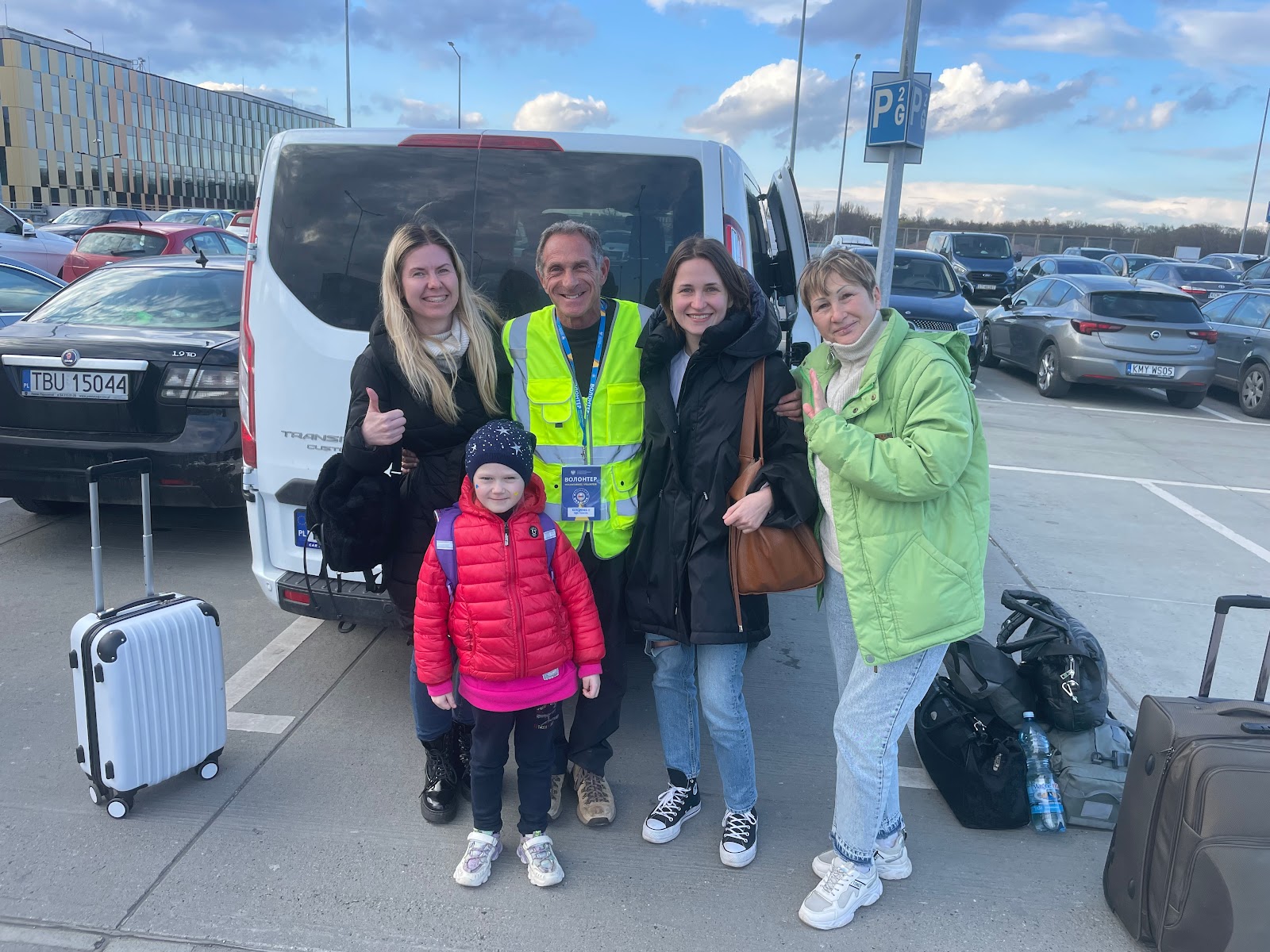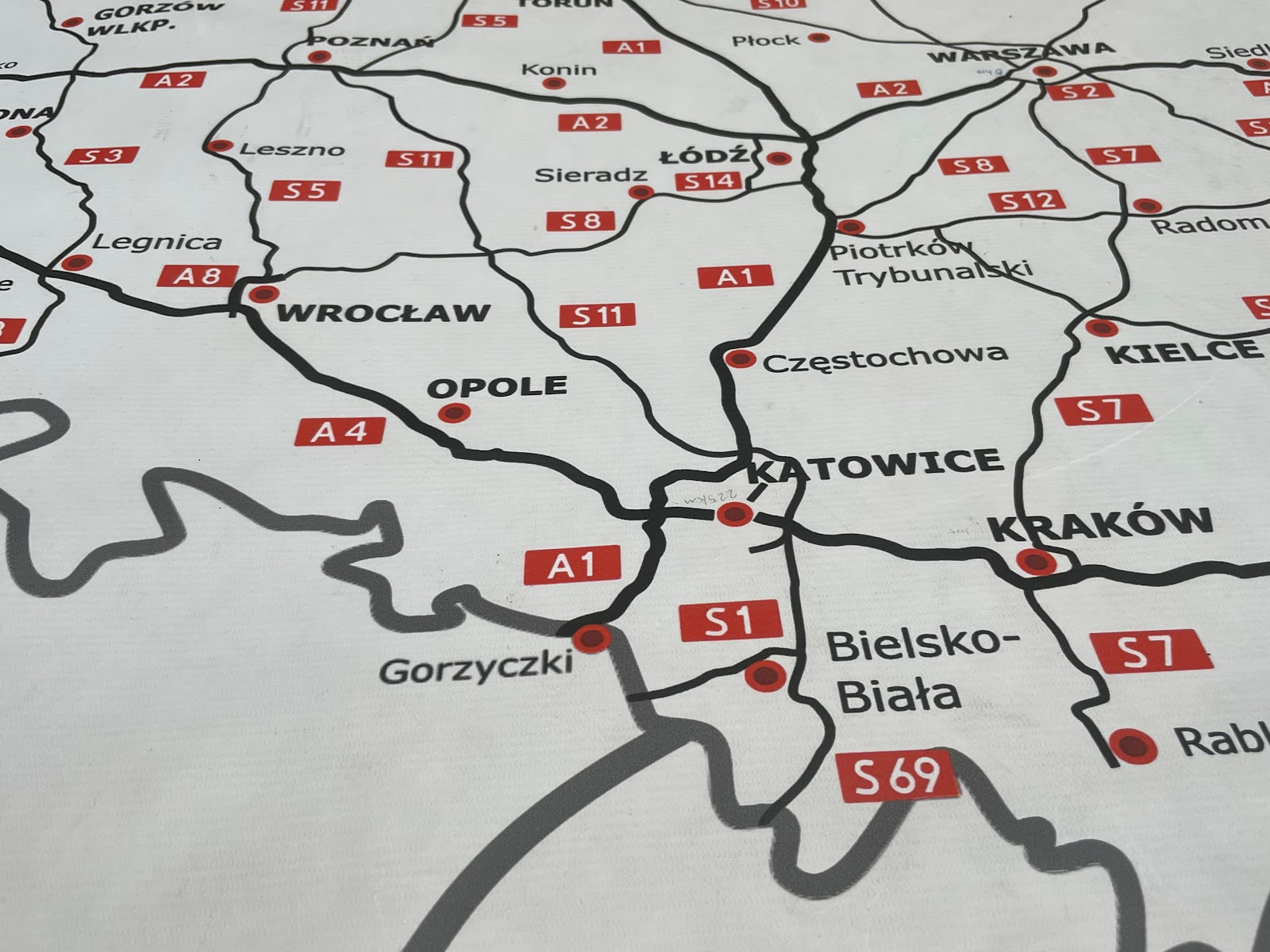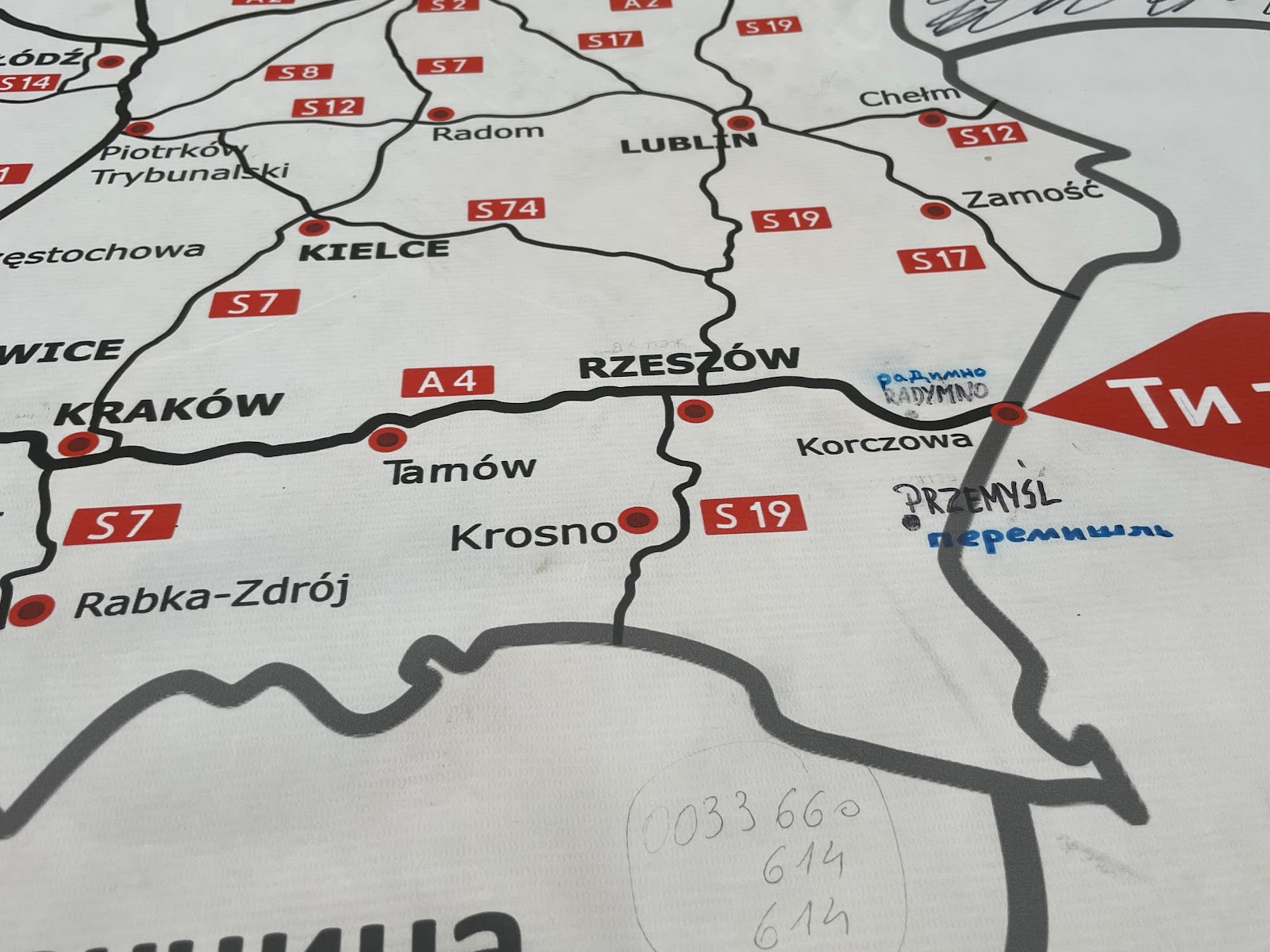April 11, 2022
Today I went directly to Korczowa refugee center. This is posted in places around the center.
Children are running, jumping, scootering, chasing each other, zipping in and out of depressed adults. Not all the adults, but many of them. Faces that look like lead masks. A lot of sleeping during the day.My guess is that the ones that have not been able to find a place to go are the ones who look the most leaden. Because the people I’ve been transporting, for the most part, seem very happy to be leaving for somewhere else.
I am developing something of a network in Korczowa. This includes Alex, who is a Jewish Ukrainian man living in New Jersey. He is here as an interpreter with an organization called Russians for Ukraine. He did some interpreting for me and we exchanged numbers. If he isn’t physically present, I call him, put him on speaker, and he translates. As he interacts with people, he may become aware of people needing a ride, and put them in touch with me.
As I am starting to build a list of people wanting to go to Krakow or nearby, Barbara, a Polish woman who speaks English, and is a general resource/dispatch person, says she has arranged for a boy to take his sick dog to a vet in a town nearby, would I be willing to take him. The drive isn’t far, but I would have to stay while the dog was being treated.
I say yes, but Alex is concerned that the effort to fill the “Krakow Express” to the train station will be disrupted and we agree he should take them. After all, he can work “remotely” via phone.
We have six adults and two children this time.
I think I have matched the names to the faces correctly, but there could be mistakes.
Luba on the far right in the picture gives me a big hug and says in my ear: You came all the way from California to get me to the train station. American. You do this. I love you. Thank you.
Crying writing this. At that moment I feel like I am personally representinG what is good about our country. The America that has broad shoulders, that is kind, generous, and willing to do what’s necessary to help others when they’re in need.
Obviously neither America or me are that way all the time, sometimes the complete opposite of that, making me the perfect representative. :) Neither of us has given up trying to be better.
Reading the news I understand why I’m getting such big hugs, tearful blessings. The talk at the refugee center is the news has shown a third of the reality of Bucha.
Along and her 12 year old son, Igor, wouldn’t be in the picture. Alona said her hair is a mess and she looks terrible. Marine and Zhenya laughed and teased her, told her not to be silly, just get in the picture. Igor did not look like he was doing well. Olestra, his sister, hopped into the picture.
My hunch was Olesya was holding the belief that the adults would take care of everything and Igor was holding the real uncertainty of the situation, the real limits of the adults’ ability to make it better. And that he had the feelings that went with that.
The train station sits below a huge shopping mall. Unlike American malls, this is bustling and alive with people and colorful stores. Lots of people, excitement, affluence, consumerism.
I wanted to walk in with the family and make sure they connected with the friends who were to meet them, house them. I wanted to be there to take them somewhere else if the meet-up didn’t happen.
I got the “whim-whams”, a moment of disorientation and nausea, like the ground was rolling under me, as the refugee center and the shopping center collided. How could this be 2 1/2 hours up the highway from the refugee center?
The Peace Corps had a program where they paid for brief therapy with volunteers returning to America, dealing with the disorientation that accompanied re-entry. I treated some people through this program. They all described the whim-whams, usually feeling it in supermarkets.
The abundance, rows and rows and rows of the same food, in different packages, taken for granted, colliding with the reality of the poverty and harshness of life where they had just been.
This is Dimas, who was also on this trip. He speaks English and as I was taking him to Katowice, about an hour from Krakow, we got to talk a lot.
He is a manager of software engineers for a large international company that makes betting apps, some of which, if I understood correctly, are embedded in video games.
His company was instrumental in finding a place for him, his wife, and three year old daughter to stay in Cypress, as well as setting him up to work from there. He was on his way there to re-join them.
He said the war started on his birthday. They left in a car from Kyiv and it took them 28 hours to get to the border, usually a 9 hour trip. They then waited 12 hours, outside, through the night, in the windy rain and cold, to pass through into Poland on foot. It is unpleasant to be outside in the cold windy rain making the three minute walk from the van across the parking lot to the center.
He said it was volunteers “like you” who built fires, and brought blankets, hot soups throughout the night, that kept his daughter from getting sick, kept them alive and well.
Like other Ukrainians have told me, they are amazed, their hearts overflow with gratitude, at the unexpected kindness, caring, the world has shown them.
His wife also works for an international software company in accounting. Their dream is to get to California. He said it was very hard to get a visa, but they would persist and get there. He joked that he thinks his 3 year old daughter might go into management, as she orders him and her mother around all the time.
Dimas said he doesn’t make much money now, but he will if he can work for his company in other countries. He said he is sending a lot of money to his parents, who remain in Kyiv. The price of goods has gone up three to five times from what it was.
I asked why his parents didn’t leave. He said they say they’ve worked all their lives to buy the house in Kyiv, they are not leaving it to be poor and have nothing in Cypress. He said they would do fine in Cypress, and that his appeals to think of their safety, not their possessions, has been in vain.
He had returned to try to persuade them to leave, as well as to pick up more of his family’s things. Dimas related that some of his contemporaries felt the same way, that they would wait it out, they had just bought houses, and couldn’t give them up to start over.
Dimas said it was very painful to see the destruction in his city. He said you can think about the streets you drive on every day, buildings you know, being bombed, destroyed, but seeing it . . .I was watching out of the corner of my eye, navigating strange streets, but I noticed this very optimistic for the future young man stopped, turned his head away, like Igor, feeling the enormity of it. And then the optimism you see in that smile in the picture was back.





Thank you for the update David--it is good to see this through your eyes--so much realer and I think all of us can more easily put ourselves in the place of the people you are helping--I continue to feel so grateful to you for helping me see what is happening to the people, not just to the country--
ReplyDeleteDavid, what you are doing is absolutely incredible. You are representing what our Country is all about! Thank you! Be safe and know that we are keeping you and all of the people over there in our hearts and prayers. -Angela
ReplyDeleteDavid, thanks for sharing your incredible journey. Your accounts of situation both breaks my heart with the tragedy happening and then warms my heart hearing about the work being done by volunteers.
ReplyDeleteStay safe.
It is such valuable work you are doing in Poland, David, and it's really helpful to be able to read your account of your experience there. You are "personally representing what is good about our country", and also helping your readers to better understand what's happening there.
ReplyDeleteYou are giving us a small window into the enormity of the situation, and the stretching of minds and hearts to deal with it all, while you navigate your daily journey with refugees seeking a safe landing.
Thank you for doing this incredibly important work! Warmest wishes to you on your journey.